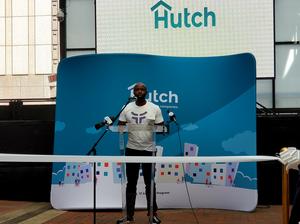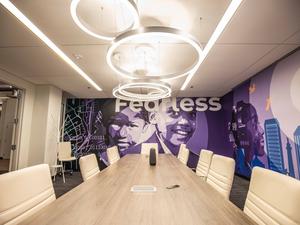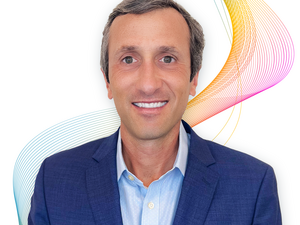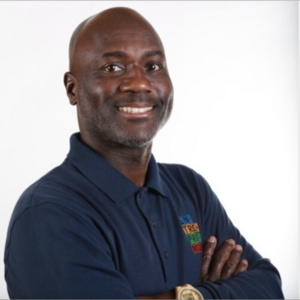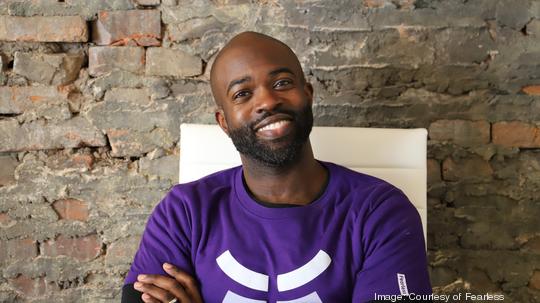
Fearless is planning to spread across the country and the world after winning several big contracts with the federal government.
The Baltimore tech company has graduated from the Small Business Administration's 8(a) Business Development program after nine years. The 8(a) program allowed Fearless to work as a prime information technology and software contractor with the federal government, helping it grow from $2 million in revenue in 2015 to $48 million in 2021. The company is now on track to make $75 million this year and hit $100 million in revenue in 2023. Its staff has bulked up from 15 people to more than 250.
CEO Delali Dzirasa is using the departure from the 8(a) program — and several recent large contracts — as a jumping-off point for Fearless' future as it goes after private-sector clients such as hospitals and nonprofits. And he said the next step is international expansion, a big step for a company that has hired almost exclusively in Baltimore.
"We're going to be thinking through what other physical locations that we might need across country or across the world," Dzirasa said. "And those locations also have will have an intense local focus to drill down in those communities and support those communities."
Fearless's contract with the National Archives and Records Administration has a committed value of $1.1 million with the potential to increase to $65.7 million over five years. The company also previously won two separate contracts with the Centers of Medicaid and Medicare Services, a part of a $500 million dollar deal and a separate $67 million contract.
Dzirasa said future contracts will be much wider in scope, lasting for three to five years instead of one to two years. Dzirasa will shift from building a single widget of software to complete one task to building entire programs with countless moving parts, he added.
Along with the increased length of time and complexity, Fearless is now having to compete with much larger companies since it will no longer be considered a small business by the government. He would not disclose possible competitors for Fearless.
Fearless' plans to work with hospitals and nonprofits align with the company's mission to help improve people's lives. Throughout the global push, Dzirasa hopes to keep Fearless mission of building projects with a positive social impact intact, such as a recent deal to monitor diversity within the National Football League. The company plans to draw on its experience in the commercial space when creating government software. He pointed out that people in the government sphere are often impressed by Fearless's commercial work with clients like the NFL.
"There's value for us to play in both worlds," Dzirasa said.
Dzirasa plans to replicate how the company has given back to Baltimore when Fearless expands to other parts of the country. Fearless has had a presence in Montgomery, Alabama since 2019 through a contract with the United States Air Force. In Baltimore, the company has established an array of grants, along with supporting city schools and putting on tech conferences within the city. A focus on Baltimore has helped attract people to Fearless, he added, since it goes beyond what is expected of a tech company.
"When I asked new folks why did you join? As great as I think the technologies that we deliver are, It's almost always because of the culture and the community work," Dzirasa said.
Fearless is also showing other entrepreneurs how to achieve success through its Hutch incubator. The incubator is going to double in size because of a recent federal grant and a partnership with the Baltimore Development Corp.
Dzirasa hopes to expand beyond the technology field, something Fearless has already begun to explore through the Fearless Sports brand of clothing. Eventually, Fearless hopes to become a conglomerate with a variety of portfolio companies that are aligned with a socially conscious vision.
The company has eschewed one of the most common ways for growing technology companies — taking venture capital money to field expansion. Dzirasa said the strategy, though successful, was not intentional, since he simply did not know about venture capital when he started the company and pursued organic growth instead.
Fearless initially took seven years of growth to achieve a 15-person staff before later growing to 250. By not going through a traditional venture capital process, Fearless had time to figure out its culture and grow at its own pace without the pressure of outside investors.
“I didn't know any better,” Dzirasa said. “We did what we felt like we needed to do in order to grow. I'm glad that we didn't take that approach because I wanted to make sure that our foundation and our bones were right.”
